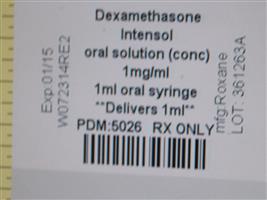Dexamethasone Intensol Solution, Concentrate while Breastfeeding

What is Dexamethasone Intensol Solution, Concentrate used for?
I am currently breastfeeding and I want to know if using Dexamethasone Intensol Solution, Concentrate is safe for my kid? Does it have any effect on milk production?

Nursing Mothers Systemically administered corticosteroids appear in human milk and could suppress growth, interfere with endogenous corticosteroid production, or cause other untoward effects. Because of the potential for serious adverse reactions in nursing infants from corticosteroids, a decision should be made whether to discontinue nursing or to discontinue the drug, taking into account the importance of the drug to the mother.
Dexamethasone Intensol Solution, Concentrate Breastfeeding Analsys
Dexamethasone while Breastfeeding
Low RiskCAS Number: 50-02-2
Pharmacokinetic data indicate that excretion into breast milk in significant levels is possible, hence for long term treatments other steroids with lower excretion would be advisable. Other steroids (Betamethasone) that are administered prior to delivery can produce a delay of Lactogenesis phase II (milk's coming in) and a decrease of milk production within the first post-partum week. Intra-articular injected large doses of other steroids (Triamcinolone, Methylprednisolone) may transiently affect milk production. A decrease of prolactin release after administration of dexamethasone has been observed that may decrease milk production mostly in the first post-partum weeks. Topical use: Because of a low absorption through skin significant excretion into breast milk is unlikely. Additionally, a high protein binding makes excretion even more unlikely. Whenever a treatment for nipple eczema or dermatitis is required the lowest potency steroid compound should be used. It should be applied right after the feed to make sure it has disappeared before the next nursing occurs. Otherwise, wipe cream out with a clean gauze. Do not continuously use for longer than a week. Reportedly, a case of mineral-steroid toxicity has occurred due to continuous use of cream on the nipple. Creams, gels or similar products that contain paraffin or mineral oil should not be used on the nipple to avoid absorption by the infant. Corticoids are frequently prescribed in Pediatrics with no side effects on the infant when indicated for short-term or sporadical use. On nursing mothers a timely use or not long-term treatment is compatible with breastfeeding along with the assessment of milk production. WHO Model List of Essential Drugs 2002: Compatible with breastfeeding in single dose. No data is available on long-term use.
Dexamethasone Intensol Solution, Concentrate Breastfeeding Analsys - 2
Dexamethasone while Breastfeeding
CAS Number: 50-02-2
Because no information is available on the use of systemic dexamethasone during breastfeeding, an alternate corticosteroid may be preferred, especially while nursing a newborn or preterm infant. Local injections, such as for tendinitis, would not be expected to cause any adverse effects in breastfed infants, but might occasionally cause temporary loss of milk supply.
I already used Dexamethasone Intensol Solution, Concentrate and meanwhile I breastfed my baby should I be concerned?
During whole lactation period you shall first discuss with your doctor and then together you shall decide whether you shall take that drug or not however if you have already taken Dexamethasone Intensol Solution, Concentrate then you shall inform your doctor, But you should not be worried too much as Dexamethasone Intensol Solution, Concentrate comes in category of low risk drug.
My health care provider has asked me to use Dexamethasone Intensol Solution, Concentrate, what to do?
Though Dexamethasone Intensol Solution, Concentrate dose not comes in category of safe drugs rather it comes in category of low risk but if your doctor is aware that you are breastfeeding your baby and has still recommended it then its advantages must be outweighing the risks.
If I am using Dexamethasone Intensol Solution, Concentrate, will my baby need extra monitoring?
Not much
Who can I talk to if I have questions about usage of Dexamethasone Intensol Solution, Concentrate in breastfeeding?
US
National Womens Health and Breastfeeding Helpline: 800-994-9662 (TDD 888-220-5446) 9 a.m. and 6 p.m. ET, Monday through Friday
UK
National Breastfeeding Helpline: 0300-100-0212 9.30am to 9.30pm, daily
Association of Breastfeeding Mothers: 0300-330-5453
La Leche League: 0345-120-2918
The Breastfeeding Network supporter line in Bengali and Sylheti: 0300-456-2421
National Childbirth Trust (NCT): 0300-330-0700
Australia
National Breastfeeding Helpline: 1800-686-268 24 hours a day, 7 days a week
Canada
Telehealth Ontario for breastfeeding: 1-866-797-0000 24 hours a day, 7 days a week
